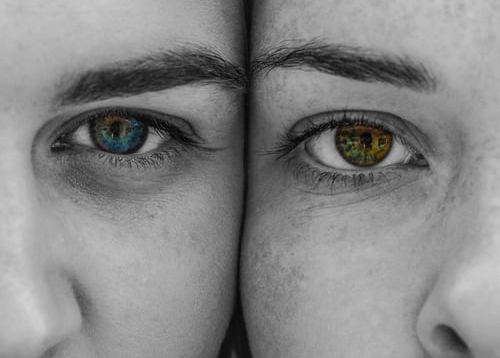The study of different types of personality has a long history. For example, Plato, Aristotle, and Descartes, among numerous other philosophers and writers, explored human personality in their works. Many of their books disclose fascinating insights into the human psyche. Modern theorists to a large extent repeated and expanded the theories set forth by these earlier thinkers.
Everyday use of personality “descriptions”
Very often we describe and assess the personalities of the people around us. As a result you might say “He has a great personality”, or “she gets her personality from her mum”. We tend to go through our lives categorizing the people we meet under several labels. Our language is full with words that describe types or groups of people. However many of them are quite judgemental and critical. Words like macho, wimp, nerd, milquetoast, playboy, redneck, square, and hippie are used to classify a type of person. Furthermore this tendency to categorize people makes a great deal of sense in some contexts. Because it is a universal human characteristic to impose order on complex situations. As complex as human behaviour can be, repeating patterns can be discerned.
Almost all human encounters implicate classifying and categorizing personalities. For example, business people usually judge their associates on their general demeanour, physical bearing, verbal style, and presumed ability to fit into the environment of a specific organization. Whereas University professors presenting technical papers to their colleagues will be judged to some degree on their personality. Indeed, it is hard to think of of any interpersonal interaction in which the evaluation of personality does not play an important role.
Even though we spend a lot of time talking about personality, many people are not quite sure exactly how and what personality psychology is really about.
Consequently, these daily reflections on how and why people behave as they do are similar to what personality psychologists do. While our informal assessments of personality tend to emphasis more on individuals, personality psychologists instead use conceptions of personality that can apply to everyone. Personality research has led to the development of a number of theories that help explain how and why certain personality traits develop.
What is personality?
It is important to understand exactly what is meant by the term personality. The word personality itself comes from the Latin word persona, which referred to a theatrical mask worn by performers in order to either project different roles or disguise their identities.
Certainly, the human personality is a unique, and complex mechanism. Personality refers to a distinctive collection of traits—characteristic patterns of thinking, feeling, and behaving. Also it originates from a mix of inborn dispositions and inclinations along with environmental factors and experiences. Although personality can change over the course of time, one’s core characteristics tend to remain steady over a lifetime.
Definitions of Personality
So due to a brief definition, personality is made up of the characteristic patterns of thoughts, feelings, and behaviours that make a person unique. In addition to this, personality arises from within the individual and remains justly consistent throughout life.
Aristotle (384–322 bce)
Aristotle referred to the seat of personality as the psyche. He proposed that the psyche is the product of biological processes. Also he saw the psyche as including a set of faculties that he placed in a hierarchy of importance. The first faculty that Aristotle distinguished is the nutritive—the human organism’s basic drives to meet its bodily needs. The next and higher faculty is the perceptual, which he defined as the aspect of mind that interprets sensory data. Lastly, and highest faculty is the intellectual, which Aristotle saw as unique to human beings.
Gordon W. Allport, (1961)
“The dynamic organization within the individual of those psychophysical systems that determine his characteristic behaviour and thought.”
Funder, (2001)
“Personality refers to individuals’ characteristic patterns of thought, emotion, and behaviour, together with the psychological mechanisms — hidden or not — behind those patterns.”
Feist and Feist, (2009)
“Although no single definition is acceptable to all personality theorists, we can say that personality is a pattern of relatively permanent traits and unique characteristics that give both consistency and individuality to a person’s behaviour.”
Although there are numerous different definitions of personality, most focus on the pattern of behaviours and characteristics that can help predict and clarify a person’s behaviour. Therefore explanations for personality can focus on a variety of influences, ranging from genetic clarifications for personality traits to the role of the environment and experience in shaping an individual’s personality.
On the other hand, environmental factors can play a role in the development and expression of personality embrace such things as parenting and culture. How children are raised can depend on the individual personalities and parenting styles of caregivers as well as the norms and expectations of different cultures.
So what exactly a personality is made up with?
As defined in the definitions above, traits and patterns of thoughts and emotions play important roles. However some of the other fundamental characteristics of personality include:
- Consistency: There is commonly a recognizable order and regularity to behaviours. Basically, people act in the same ways or similar ways in a variety of situations.
- Psychological and physiological: Personality is a psychological concept, but research also advocates that it is influenced by biological processes and needs.
- It impacts behaviours and actions: Personality does not only influence how we move and respond in our environment; it also causes us to act in certain ways.
- Multiple expressions: Personality is presented in more than just behaviour. It can also be seen in our thoughts, feelings, close relationships, and other social interactions.
Schools and Models of Personality
Above all, all methodologies to the study of personality can be separated into two categories, idiographic and nomothetic. The oldest approach and the one engaged in literature for millennia is the idiographic. Nonetheless, idiographic personality theorists stress the uniqueness of individual personalities. They suggest that no two are exactly alike. Therefore, a supporter of this approach would study each person as a whole and unique entity and would not compare his or her personality to others.
However, the nomothetic approach pressures that uniqueness exists only as a combination of quantifiable traits. According to this type, we all have a number of traits in common, and we differ only in the amount of each trait we possess.
Theories of Personality
There are many theories about how personality develops. However different schools of thought in psychology impact many of these theories. Some of these key perceptions on personality include:
- Type theories are the early perspectives on personality. These theories proposed that there are a limited number of “personality types” which are related to biological influences.
- Trait theories tend to view personality as the result of internal characteristics that are genetically based.
- Psychodynamic theories of personality are severely influenced by the work of Freud and emphasize the influence of the unconscious mind on personality. Psychodynamic theories include Freud’s psychosexual stage theory and Erikson’s stages of psychosocial development.
- Behavioural theories propose that personality is a result of contact between the individual and the environment. Behavioural theorists study observable and measurable behaviours, often ignoring the role of internal thoughts and feelings. The theorists of behaviourism include Skinner and Watson.
- Humanist theories emphasize the importance of free will and individual experience in developing a personality. Humanist theorists include Rogers and Maslow.
The Big Five Personality Traits
While there are countless characteristics that combine in an almost infinite number of ways, people have been trying to find a way to classify personality into types ever since Hippocrates and the ancient Greeks defined four basic temperaments. Today, psychologists usually define personality in terms of five basic traits. The so-called Big Five are openness to experience, conscientiousness, extraversion, agreeableness and neuroticism.

- Openness is the desire to seek out new and unacquainted experiences.
- Conscientiousness refers to the tendency toward self-discipline and planning over impulsivity.
- Extroversion defines whether one draws energy from time spent with others or time spent alone.
- Agreeableness is how cooperative, polite, and kind one inclines to be.
- Neuroticism includes emotional stability and one’s tendency toward anxiety and self-doubt.
What’s Your Personality Type?
The idea of a personality “type” is fairly extensive. Hence, many people link a “Type A” personality with a more organized, rigid, competitive, and anxious person, while a “Type B” personality signals flexibility, creativity, and relaxation. However there’s little pragmatic support for the idea. Actually, it didn’t even develop from psychology—two cardiologists created the theory as a way to understand the connection between stressed patients and the likelihood of developing heart disease and high blood pressure.
Psychologists who study personality believe such typologies generally are too simplistic to account for the many ways people differ in personality. As an alternative, there is broad scientific agreement around the Big Five. Each of these key traits contributes to one’s personality and is independent of the others.
Personality Assessments
Research on personality can bring fascinating insight in to how personality develops and changes over the course of a lifetime. The research can also have significant practical applications in the real- world.
Therefore, personality assessments are frequently used to help people learn more about themselves and their unique strengths, weaknesses, and preferences.
Some assessments might look at how people rank on specific traits, such as whether they are high in extroversion, conscientiousness, or openness. However, other assessments might measure how particular aspects of personality change over the course of development. Personality assessments can also be used to help people determine what careers they might enjoy, how well they might perform in certain job roles, or how effective a form of psychotherapy has been.
The finding from personality research can have important applications in the world of medicine, health, business, economics, technology, and other areas. Researchers have found that certain personality characteristics may be linked to illness and health behaviours. We can look for new ways to improve both personal and public health, by building a better understanding of how personality works.
https://www.16personalities.com/free-personality-test
Let me know what you thought of the article! Send your comments to psychotherapykuchenna@gmail.com

